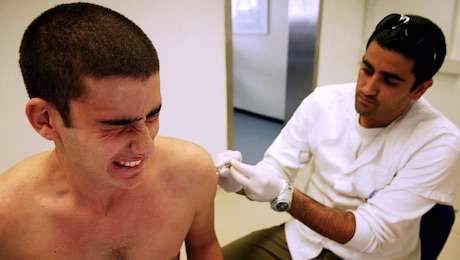A new study examining vaccine exemptions found that more Vermonters are using the religious exemption since the philosophical exemption was taken away, reflecting a national trend.
Currently, 45 states allow religious exemptions for school immunizations and 15 states allow personal belief exemptions.
In 2016, Vermont lawmakers voted to take away the personal belief exemption, prompting hundreds of Vermonters to protest at the Statehouse.
The study on the impact of such laws first appeared in the medical journal Pediatrics, in November.
According to the nationwide data compiled for the study, states with both religious and personal belief exemptions had only about a quarter of the religious exemptions claimed by parents compared to states that offer the religious option only. In Vermont, the number of kindergartners using the religious exemption expanded from 0.5 percent to 3.7 percent the year after the personal belief option was taken away.

FEW CHOICES: Vermonters can opt out of vaccinations if they fill out a religious exemption form. However, the philosophical exemption based on personal belief was removed in 2016.
According to the study’s introduction, it’s not known if the availability of the personal belief exemption directly affects use of the religious exemption.
To arrive at their conclusions, the authors performed a cross-sectional state-level analysis of publicly available aggregated data from the Centers for Disease Control and Prevention yearly vaccine reports for kindergartners, using school years 2011–2012 through 2017–2018.
They chose that timeframe to allow for meaningful comparisons to a prior study of exemption data for kindergartners based on the 2011–2012 through 2015–2016 school years.
The study also examined the status of religious thought in America, noting that while there is a general move away from organized religion in the U.S., it doesn’t mean Americans don’t retain some aspects of religious faith.
“Americans are increasingly spiritual, with 27 percent of Americans self-identifying as such in 2014, up from 19 percent in 2007. Whereas definitions of religion emphasize adherence to official teachings and traditions, definitions of spirituality emphasize one’s individual experience of the divine and individual interpretations of sacred texts or traditions,” the study states.
The authors, who say they want to help increase vaccination rates, advocate that lawmakers should differentiate between spiritual and religious beliefs when it comes to writing religious exemption policy. They also claim that those who aren’t taking vaccines may be “falling victim to vaccine misinformation.”
They further advocate that lawmakers “reconsider the purpose and nature of religious exemption laws.”
HealthChoiceVT, a grassroots organization that seeks to preserve personal and parental rights over health decisions, has stated in recent newsletters that Vermont lawmakers may attempt to remove the religious exemption in the upcoming legislative session.
Currently, there are three bills inside the Statehouse that concern vaccinations. One of those is H.238, which removes the religious exemption — the only remaining non-medical exemption for children that attend Vermont schools.
The other two bills are H.515, which lowers the age of consent for vaccinations, and H.310, which requires informed consent from the parents before vaccination.
Last year, New York State eliminated its religious exemption, prompting a large uptick in homeschooling. Some families even chose to leave the state, according to Romper.com. California, Maine, Mississippi and West Virginia are the only other states that don’t allow a religious exemption.
Michael Bielawski is a reporter for True North Reports. Send him news tips at bielawski82@yahoo.com and follow him on Twitter @TrueNorthMikeB.



One should have control of what goes into their body, right wrong or indifferent.
Freedom
How can we say we are free if we can’t control what goes in our body? Who controls our bodies? Who made our bodies?
Are we free or are we cattle? Are we slaves who don’t have control of our own destiny?
We want or chicken free range and organic, but we won’t protect the rights for ourselves?
That’s all well and good UNTIL these exempted young folks get real sick. Their parents will be the first ones with the loudest complaint.
It’s deeply wrong for the general population to be forced to take any medication. Anyone who doesn’t take vaccines and gets sick from a vaccine-preventable disease should know that that’s the price they pay. But, let’s be realistic: you have a much better chance of dying from drowning than even catching a case of measles. The measles scare is 100% manufactured in order to push through forced vaccination. They couldn’t do it with pertussis, even though this is more prevalent and more serious than measles, because pertussis cases are generally caused by vaccine failure, as has been clearly documented in the medical literature.
Who benefits from forced vaccination? The companies that sell vaccines, that’s who, and anyone who thinks vaccines aren’t profitable should look up the billions-per-year profits from Gardasil, for example. There’s a gold mine in forced vaccination, especially if they can manage to make Gardasil and other future blockbusters mandatory. Indeed, that’s likely the strategy: first eliminate non-medical exemptions, and then get those potential blockbusters on the list of recommended vaccines. Meanwhile, harms from vaccine are ignored: the CDC is following pharma’s playbook on that one.